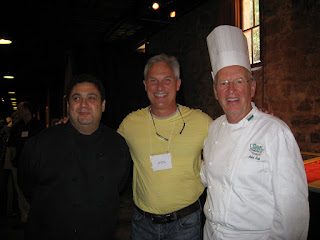
Over the past decade, American consumers have embraced the advantages of fresh, local produce and ingredients. The popularity of farmers markets and the growth of Whole Foods Market are vivid proof of this culinary transformation. Yet, consumers continue to use rancid, fraudulent and inferior olive oil with these tasty fresh ingredients. Too often, the bottle is labeled Extra Virgin olive oil.
Beyond Extra Virgin, an international olive oil conference, held in Davis and at the Culinary Institute of America (CIA) at Greystone in California sought to address this issue and give legitimacy and meaning to the term, Extra Virgin. Presented by the University of California-Davis Olive Oil Center, the CIA-Greystone and others, 300 industry professionals from growers to chefs gathered to discuss how to improve quality and educate consumers and the culinary world about the advantages and uses of Extra Virgin olive oil.
Dan Flynn, Executive Director of the UC-Davis Olive Oil Center, offered an accurate metaphor for explaining the current standards (actually there are none in the U.S.). According to Flynn, "we are all too familiar with the school grading system: A,B,C, and the dreaded D and F. With Extra Virgin olive oil, it is a pass-fail system." There are no A, B or C grades. A turtle could jump over this bar. Mediocrity reigns. To add to the saga, Flynn noted “an oil can even fail when it passes if adulterated oil has been added.” It’s not uncommon for an Extra Virgin olive oil to contain another seed oil or refined olive oil.
To bypass legislation and pursue excellence, a major focus of the conference was a new vision offered by the charming and eloquent Claudio Peri, President of the Association TRE-E. Through its membership, TRE-E is seeking to establish quality by seeking worldwide recognition of a Super Premium grade of Extra Virgin olive oil. Members are subjected to rigid standards requiring direct control of the production process from tree to bottle, and even transportation and storage. The reaction from Californians and international growers was mostly skeptical, but the concept has the support of the U.C Davis Olive Oil Center and the CIA-Greystone. Regardless of the product, farmers are an independent species and are not often fond of regulations and control. It’s worth learning more about this concept of Super Premium Extra Virgin olive oil. More information can be found at www.tre-e.org.
An encouraging note came from CIA-Greystone’s efforts to educate chefs about the multiple uses of olive oil. Every night on the Foodnetwork a well meaning, uninformed celebrity chef is telling the audience not to cook with Extra Virgin olive oil, mostly because of the smoke point. A long stream of international chefs and researchers debunked that myth. The two major advantages of olive oil over other oils are flavor and health benefits. Extra Virgin olive oil is more than a monounsaturated fat. The phenolic (antioxidants) compounds separate it from all other oils.
The language of olive oil was on trial at the conference. The importance of merchants and the rest of us to speak in layman’s terms about the style of the oil (mild, medium and robust) and the sensory language was emphasized frequently. Richard Gawel, a top researcher and expert in Australia, suggested using apple as way to describe an oil—green to yellow. Most people can relate to a green or an over ripe yellow apple. The use of the term bitter in our sensory evaluation caused a bitter exchange among attendees. Typically, Americans don’t like bitterness and pungency, which I can confirm from my own education efforts over the past ten years. On the other hand, it was argued that the success of high quality chocolate has used the term bitter successfully. As is usually the case on these issues, the truth is somewhere in the middle. There’s no doubt a large segment the American consumers have a distaste for bitter.
There was considerable attention given to pairing styles of olive oil with food. Here, I must take slight exception. There is value in knowing not to use a newly harvested Tuscan olive oil on a filet of red snapper. By talking too much, however, about pairing food and olive oil, runs the risk of complicating and confusing the newcomer to olive oil. I’m reminded of an old adage in organizational behavior, which advises to only employ an intervention that the organization (or patient) is ready for. I’m not convinced the American consumer is ready for food and olive oil pairings. The KIS (keep it simple) principle is advisable.
In the final analysis, Beyond Extra Virgin was an outstanding conference and most definitely worth attending. It was in one word—provocative! I have been an event planner of conferences for many years and provocative is always the most desired objective. Simply having a gathering of clapping seals does not ensure an excellent conference.
Beyond Extra Virgin will be in Florence, Italy in 2010. I can already taste the steak Florentine and the Brunello di Montalcino.




No comments:
Post a Comment